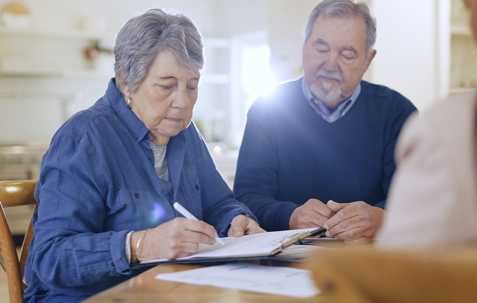Many people, particularly those who think their life is uncomplicated, may wonder: “Why should I have a Will?” In Florida, if you do not have a Will, the state intestate law shall govern. This means that the law shall write a Will for you.
Although some people believe their possessions will go directly to the state if the law writes a Will for them, this is rarely true. Possessions only go to the state when no blood relatives can be found and there is no Will. Even so, you may not like how or where your estate would be distributed according to Florida law. A Will allows you to choose what happens in advance so that your wishes will be carried out after you are gone.
Here are eight reasons why you need to draft a Will to include in your estate plan:
Reason #1: Choose Who Inherits Your Assets
A Will allows you to choose who receives your earthly belongings after you die. In most cases, you have the right to choose who your possessions will go to. For some people, that may not seem necessary because they have only one beneficiary: their spouse or their only child (who would also be the person chosen by the law). But, sometimes the state’s directive may not be in line with your wishes. In situations where family dynamics are more complicated, the Will makes your wishes clear to everyone.
Reason #2: “What If” Situations
A Will can be used to cover various “what if” situations. For example; what if a beneficiary that you name does not survive you? With a properly drafted will, you can write in that person’s portion would be distributed.
Reason #3: Leave More for Certain Beneficiaries
A Will allows you to make unequal provision for beneficiaries. There are times when people want to leave gifts to loved ones, but not in equal amounts. For instance, Mary, for her own personal reasons, may want to leave 50% of her estate to her one sister while leaving 25% each to her two other sisters. A gift like this is usually possible with a Will.
Reason #4: Special Provisions for Disabled Beneficiaries
A Will allows you to make special provisions for a disabled beneficiary. Years ago, people who had disabled children just left them out of the estate because the disabled child could not handle the funds, or so the disabled beneficiary would not lose their public benefits.
There is a much better way to provide for disabled loved ones without excluding them. Certain types of trusts that can be part of a will (testamentary special needs trusts) can allow for gifting to a disabled individual without putting their public benefits at risk. These trusts can be handled and managed by other family members, but not owned by those family members. These kinds of provisions reduce the possibility of funds being diverted away from the individual and are often a win-win for everyone involved.
Reason #5: Guardianship for Minor Children
If you have minor children, a Will allows you to voice who you would want to be their guardian (those who the children live with) should you pass away. It is difficult to imagine your children being raised by someone else. However, if the unlikely event of your early death were to occur, many times confusion rules.
The first thing the provision that names a guardian does is inform all involved who you would choose to raise your children if neither you nor their other parent were able to. It reduces confusion and clarifies for those left behind what your wishes would be. While the choice of a guardian may depend on the Court, the written wish of the parent(s) in a Will takes priority.
Reason #6: Testamentary Trust
People with minor children or grandchildren often name them as beneficiaries. In a Will, you can make a provision called a testamentary trust (a trust that doesn’t come into play unless you die) so that the child’s funds can be managed by the person you choose until the minor is the age you choose.
If you do not have a Will and pass away when the child is a minor, the Court would require a guardianship for handling the child’s funds until they reach legal age. Guardianship can be costly and burdensome for all involved.
Reason #7: Choose Your Personal Representative or Executor
A Will allows you to choose who would be your personal representative or executor to settle your estate and/or carry out the directives in your Will. Most of us know who we would trust to handle our affairs and wrap up our lives if we were to die. But, the Court doesn’t. Thus, the law provides an order of priority for the selection of a personal representative.
If two in the law’s order of priority compete for the same position, a judge will choose. You can avoid this by choosing that person in advance. You can also choose an alternate personal representative for the “What if.” Naming a Personal Representative allows you to make that choice most times. However, in Florida, most non-relatives who are not residents of Florida cannot serve even if you choose them. If it is important to you to name an out of state non-relative, then maybe a trust would be a better choice for you.
Reason #8: Disinherit a Beneficiary
A Will allows you to disinherit someone who would otherwise be a beneficiary. There are times when you may wish to disinherit someone who would otherwise be a beneficiary. That may be a close relative who broke ties years ago and you don’t know where to find them, or someone that you just don’t believe should receive anything from your estate.
Whoever it is, without a Will the law assumes that you wish to follow your bloodline. In some cases, you can attempt to disinherit someone like a spouse or minor child, but those people have special rights and may challenge your Will and receive from the estate regardless.
We Can Draft a Will for Your Estate Today
Most times we find that having a Will can help things go easier for the survivors once a person dies. When combined, Powers of Attorney and Living Wills can make up a solid estate plan. While we have discussed some major ways a Will can help you, there are still more benefits to explore.
We believe that an experienced attorney should guide you through the process of making your Will. The documents you walk away with are the outcome of the time you and your attorney spend sorting through your options to pair them with your unique circumstances. A good estate planning or elder law attorney will walk you through the process of deciding what your Will should say, then prepare a Will that meets your specific needs.
To schedule a consultation with HKH Elder Law, please give us a call today at (727) 240-2350.

